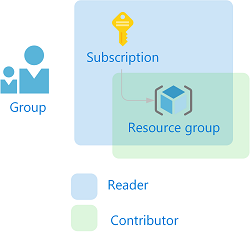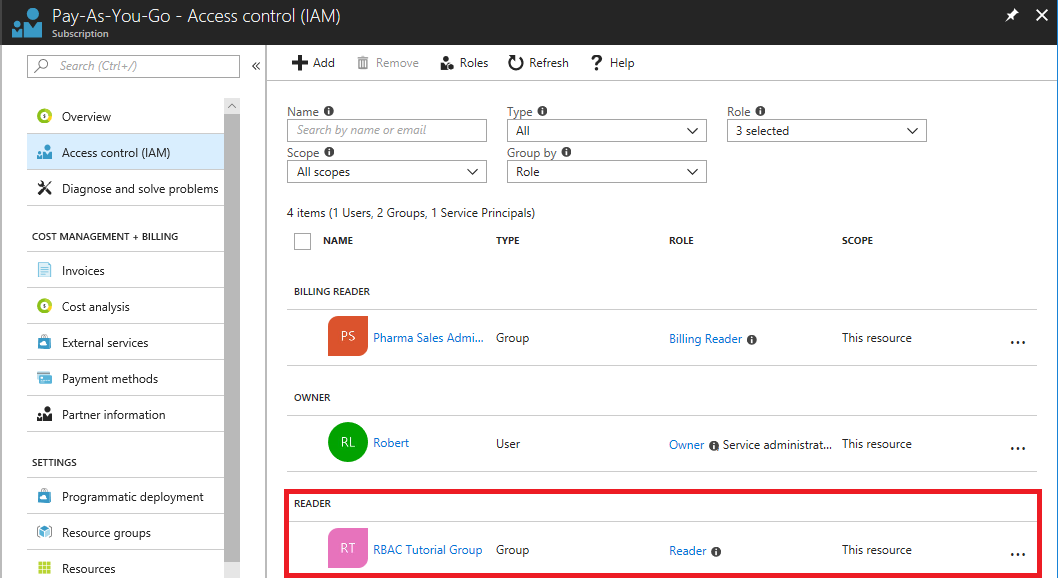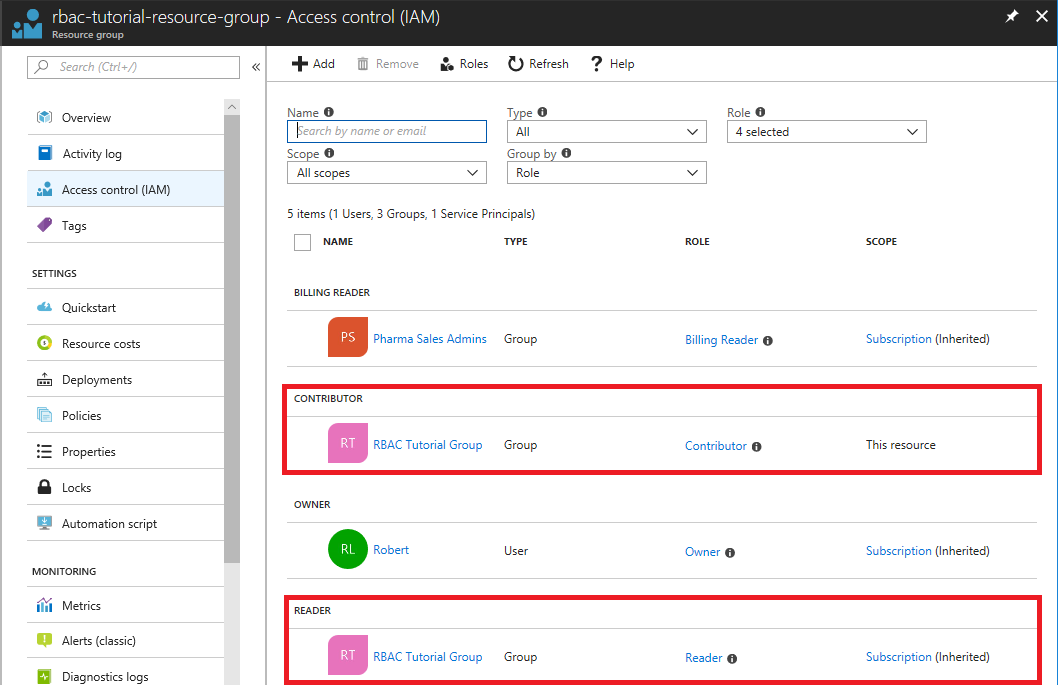Note
Access to this page requires authorization. You can try signing in or changing directories.
Access to this page requires authorization. You can try changing directories.
Azure role-based access control (Azure RBAC) is the way that you manage access to Azure resources. In this tutorial, you grant a group access to view everything in a subscription and manage everything in a resource group using Azure PowerShell.
In this tutorial, you learn how to:
- Grant access for a group at different scopes
- List access
- Remove access
If you don't have an Azure subscription, create a Trial before you begin.
Note
We recommend that you use the Azure Az PowerShell module to interact with Azure. To get started, see Install Azure PowerShell. To learn how to migrate to the Az PowerShell module, see Migrate Azure PowerShell from AzureRM to Az.
Prerequisites
To complete this tutorial, you will need:
- Permissions to create groups in Microsoft Entra ID (or have an existing group)
- Microsoft Graph PowerShell SDK
Role assignments
In Azure RBAC, to grant access, you create a role assignment. A role assignment consists of three elements: security principal, role definition, and scope. Here are the two role assignments you will perform in this tutorial:
| Security principal | Role definition | Scope |
|---|---|---|
| Group (RBAC Tutorial Group) |
Reader | Subscription |
| Group (RBAC Tutorial Group) |
Contributor | Resource group (rbac-tutorial-resource-group) |

Create a group
To assign a role, you need a user, group, or service principal. If you don't already have a group, you can create one.
In Azure powershell, create a new group using the New-MgGroup command.
New-MgGroup -DisplayName "RBAC Tutorial Group" -MailEnabled:$false ` -SecurityEnabled:$true -MailNickName "NotSet"DisplayName Id MailNickname Description GroupTypes ----------- -- ------------ ----------- ---------- RBAC Tutorial Group aaaaaaaa-0000-1111-2222-bbbbbbbbbbbb NotSet {}
If you don't have permissions to create groups, you can try the Tutorial: Grant a user access to Azure resources using Azure PowerShell instead.
Create a resource group
You use a resource group to show how to assign a role at a resource group scope.
Get a list of region locations using the Get-AzLocation command.
Get-AzLocation | select LocationSelect a location near you and assign it to a variable.
$location = "chinanorth"Create a new resource group using the New-AzResourceGroup command.
New-AzResourceGroup -Name "rbac-tutorial-resource-group" -Location $locationResourceGroupName : rbac-tutorial-resource-group Location : chinanorth ProvisioningState : Succeeded Tags : ResourceId : /subscriptions/aaaa0a0a-bb1b-cc2c-dd3d-eeeeee4e4e4e/resourceGroups/rbac-tutorial-resource-group
Grant access
To grant access for the group, you use the New-AzRoleAssignment command to assign a role. You must specify the security principal, role definition, and scope.
Get the object ID of the group using the Get-MgGroup command.
Get-MgGroup -Filter "DisplayName eq 'RBAC Tutorial Group'"DisplayName Id MailNickname Description GroupTypes ----------- -- ------------ ----------- ---------- RBAC Tutorial Group aaaaaaaa-0000-1111-2222-bbbbbbbbbbbb NotSet {}Save the group object ID in a variable.
$groupId = "aaaaaaaa-0000-1111-2222-bbbbbbbbbbbb"Get the ID of your subscription using the Get-AzSubscription command.
Get-AzSubscriptionName : Pay-As-You-Go Id : 00000000-0000-0000-0000-000000000000 TenantId : aaaabbbb-0000-cccc-1111-dddd2222eeee State : EnabledSave the subscription scope in a variable.
$subScope = "/subscriptions/aaaa0a0a-bb1b-cc2c-dd3d-eeeeee4e4e4e"Assign the Reader role to the group at the subscription scope.
New-AzRoleAssignment -ObjectId $groupId ` -RoleDefinitionName "Reader" ` -Scope $subScopeRoleAssignmentId : /subscriptions/aaaa0a0a-bb1b-cc2c-dd3d-eeeeee4e4e4e/providers/Microsoft.Authorization/roleAssignments/00000000-0000-0000-0000-000000000000 Scope : /subscriptions/aaaa0a0a-bb1b-cc2c-dd3d-eeeeee4e4e4e DisplayName : RBAC Tutorial Group SignInName : RoleDefinitionName : Reader RoleDefinitionId : acdd72a7-3385-48ef-bd42-f606fba81ae7 ObjectId : aaaaaaaa-0000-1111-2222-bbbbbbbbbbbb ObjectType : Group CanDelegate : FalseAssign the Contributor role to the group at the resource group scope.
New-AzRoleAssignment -ObjectId $groupId ` -RoleDefinitionName "Contributor" ` -ResourceGroupName "rbac-tutorial-resource-group"RoleAssignmentId : /subscriptions/aaaa0a0a-bb1b-cc2c-dd3d-eeeeee4e4e4e/resourceGroups/rbac-tutorial-resource-group/providers/Microsoft.Authorization/roleAssignments/00000000-0000-0000-0000-000000000000 Scope : /subscriptions/aaaa0a0a-bb1b-cc2c-dd3d-eeeeee4e4e4e/resourceGroups/rbac-tutorial-resource-group DisplayName : RBAC Tutorial Group SignInName : RoleDefinitionName : Contributor RoleDefinitionId : b24988ac-6180-42a0-ab88-20f7382dd24c ObjectId : aaaaaaaa-0000-1111-2222-bbbbbbbbbbbb ObjectType : Group CanDelegate : False
List access
To verify the access for the subscription, use the Get-AzRoleAssignment command to list the role assignments.
Get-AzRoleAssignment -ObjectId $groupId -Scope $subScopeRoleAssignmentId : /subscriptions/aaaa0a0a-bb1b-cc2c-dd3d-eeeeee4e4e4e/providers/Microsoft.Authorization/roleAssignments/ffffffff-eeee-dddd-cccc-bbbbbbbbbbb0 Scope : /subscriptions/aaaa0a0a-bb1b-cc2c-dd3d-eeeeee4e4e4e DisplayName : RBAC Tutorial Group SignInName : RoleDefinitionName : Reader RoleDefinitionId : acdd72a7-3385-48ef-bd42-f606fba81ae7 ObjectId : aaaaaaaa-0000-1111-2222-bbbbbbbbbbbb ObjectType : Group CanDelegate : FalseIn the output, you can see that the Reader role has been assigned to the RBAC Tutorial Group at the subscription scope.
To verify the access for the resource group, use the Get-AzRoleAssignment command to list the role assignments.
Get-AzRoleAssignment -ObjectId $groupId -ResourceGroupName "rbac-tutorial-resource-group"RoleAssignmentId : /subscriptions/aaaa0a0a-bb1b-cc2c-dd3d-eeeeee4e4e4e/resourceGroups/rbac-tutorial-resource-group/providers/Microsoft.Authorization/roleAssignments/00000000-0000-0000-0000-000000000000 Scope : /subscriptions/aaaa0a0a-bb1b-cc2c-dd3d-eeeeee4e4e4e/resourceGroups/rbac-tutorial-resource-group DisplayName : RBAC Tutorial Group SignInName : RoleDefinitionName : Contributor RoleDefinitionId : b24988ac-6180-42a0-ab88-20f7382dd24c ObjectId : aaaaaaaa-0000-1111-2222-bbbbbbbbbbbb ObjectType : Group CanDelegate : False RoleAssignmentId : /subscriptions/aaaa0a0a-bb1b-cc2c-dd3d-eeeeee4e4e4e/providers/Microsoft.Authorization/roleAssignments/ffffffff-eeee-dddd-cccc-bbbbbbbbbbb0 Scope : /subscriptions/aaaa0a0a-bb1b-cc2c-dd3d-eeeeee4e4e4e DisplayName : RBAC Tutorial Group SignInName : RoleDefinitionName : Reader RoleDefinitionId : acdd72a7-3385-48ef-bd42-f606fba81ae7 ObjectId : aaaaaaaa-0000-1111-2222-bbbbbbbbbbbb ObjectType : Group CanDelegate : FalseIn the output, you can see that both the Contributor and Reader roles have been assigned to the RBAC Tutorial Group. The Contributor role is at the rbac-tutorial-resource-group scope and the Reader role is inherited at the subscription scope.
(Optional) List access using the Azure Portal
To see how the role assignments look in the Azure portal, view the Access control (IAM) blade for the subscription.

View the Access control (IAM) blade for the resource group.

Remove access
To remove access for users, groups, and applications, use Remove-AzRoleAssignment to remove a role assignment.
Use the following command to remove the Contributor role assignment for the group at the resource group scope.
Remove-AzRoleAssignment -ObjectId $groupId ` -RoleDefinitionName "Contributor" ` -ResourceGroupName "rbac-tutorial-resource-group"Use the following command to remove the Reader role assignment for the group at the subscription scope.
Remove-AzRoleAssignment -ObjectId $groupId ` -RoleDefinitionName "Reader" ` -Scope $subScope
Clean up resources
To clean up the resources created by this tutorial, delete the resource group and the group.
Delete the resource group using the Remove-AzResourceGroup command.
Remove-AzResourceGroup -Name "rbac-tutorial-resource-group"Confirm Are you sure you want to remove resource group 'rbac-tutorial-resource-group' [Y] Yes [N] No [S] Suspend [?] Help (default is "Y"):When asked to confirm, type Y. It will take a few seconds to delete.
Delete the group using the Remove-MgGroup command.
Remove-MgGroup -GroupID $groupIdIf you receive an error when you try to delete the group, you can also delete the group in the portal.